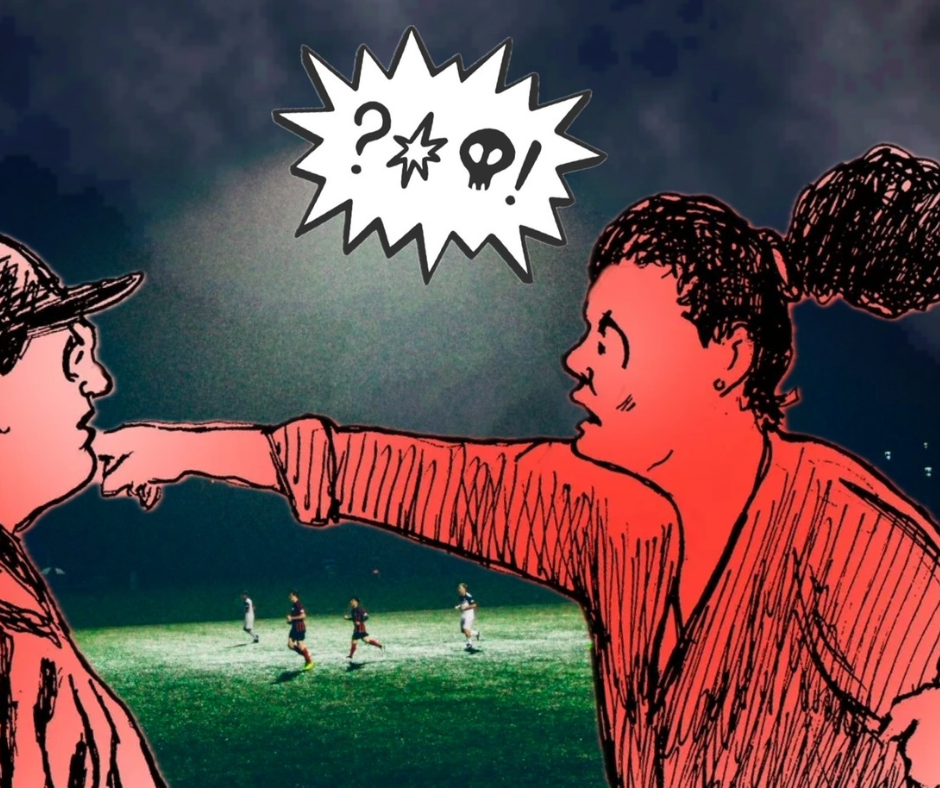So This Happened At Last Night’s Game…
What has to happen before changes will be made?
It was my son’s last high school soccer match of his freshman season. It was the last match because they lost. Tensions were high during this foggy, faraway game. Feeling the apprehension that this might be their last game, parents (all moms) were yelling more than usual throughout the match. It was loud, aggressive, and incessant. There was a frustrated and angry tone that put me on edge. I could only imagine the pressure their child must have felt to “Go Faster!” and “Get him!”. The disappointment in their voices was noticeable whenever a child made a mistake. All I could think was, “That poor kid”. They appeared to be doing their best out there, but it wasn’t enough for some moms. A winning outcome was the most important thing at that moment.
As can be expected in boys’ high school soccer, there were some fouls. Even though referees are typical targets of parents’ frustrations, I was shocked at how these moms chose to behave and the things they chose to say. “Idiot!”, “You want me to come out there and do your job?” and even threats: “You better be careful after the game!”. One mom even called a child a dick. Even though they were high schoolers, still a child. After the game, a young player from our team and his father walked past me, and I could hear the father listing all the mistakes the player had made during the game and what he should have done differently. It broke my heart. The boy was undoubtedly disappointed that they lost, and now, he had to hear all the things he did wrong in the game from a person whose job it is to uplift and support him during difficult, disappointing times. That poor kid. All I could ask myself is: what has to happen? What will bring about a change in our parental behavior? Our negative behavior and player pressure are overshadowing youth sports. It’s taking over and casting a negative light on youth sports. What about the idea of youth sports as play?
My Daughter Quit Sports, and This Is What You Need To Know
The pressure we put on our young athletes and our behavior in youth sports is an issue. In a 2011 study, researchers interviewed a group of boys and girls aged 7-14 in a tennis summer camp about how they would like their parents to behave at their sports competitions. Most participants indicated that they would rather lose a game or match than see their parents behaving like a “crazed fan” by yelling at an official or coach (Omli & Wiese-Bjornstal, 2011). They would rather lose.
Isn’t it our job as parents to teach our children? Aren’t we models for them? Is this how we want them to behave while watching their future child play sports? There must be a change. Youth sports were once a pure form of play. Play and fun were the reasons we put our kids in sports. Over the years, my own four youth athletes have heard me say countless times parents are the biggest problem in youth sports.
Why Are So Many Kids Quitting Youth Sports
In our local community, in recent weeks, we have had two high school coaches resign from their jobs midseason due to the negative behavior of parents. And just yesterday, law enforcement reported to a local high school basketball game to intervene when violence broke out among parents. There has to be a change.
Various solutions have been proposed and implemented on an organizational level to improve behavior during competition. These include interventions that are proactive in nature (codes of conduct contracts to sign and “Silent Sundays”) as well as reactive in nature (fining or banning parents from attending games), yet still, we have a very big problem that doesn’t seem to be going away. What has to happen? I’m afraid to think that we might be waiting for a larger epidemic of increased violence, depression, or suicide before developing a meaningful and lasting solution to promote change. Let’s not let it get any farther.
What Positive Sports Parenting Looks Like
Maybe to spark a lasting change, we need to implement incentives for parents behaving appropriately (reduction of club fees?), swift and firm consequences for parents not behaving appropriately (ejection after the first aggressive comment?), required and ongoing training programs for parental behavior (teaching alternative behaviors to negative behavior?), stricter guidelines with a zero-tolerance policy regarding behavior at events (no direct comments aimed at referees, or no corrections shouted from the sidelines?) or monetary consequences (per-incident fines for breaking the preset rules during a game).
Additionally, it is imperative that the issue of negative parental behavior in youth sports needs to be discussed and disseminated more. We hear about the occasional extreme occurrence, but often the issue is chalked up to “well, that’s just sports.” We often accept and normalize this kind of behavior, but it is having an effect on kids and on youth sports participation. Positive spectator behavior can contribute to more enjoyment and motivation while negative spectator behavior, such as criticizing and yelling, can cause the participating child to have a stressful, negative experience and want to drop out of sport.
I implore you to look at your own individual behavior the next time your child plays and ask yourself a few questions: Am I proud of my behavior right now? How would a child view my behavior right now? How would I feel if I watched a video of myself? and Would I want someone to behave this way towards me?
Improving parental behavior in youth sports will lead to a more positive experience for every coach, child, parent, and official involved. Let’s make a change.
